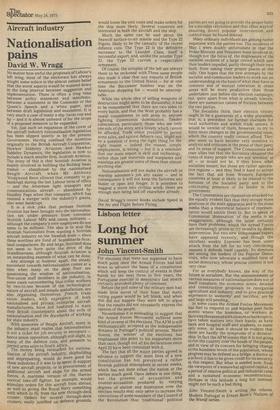Lisbon letter
Long hot summer
John Vincent-Smith
For elections that were not supposed to have much point once the Armed Forces had laid down in advance the basis of a constitution which will keep the control of events in their -hands for the next three to five years, the Portuguese exercise in democracy last month certainly provoked plenty of comment.
Before the poll some of the military men had made little secret of their hope that many voting papers would be left blank, and when this did not happen they were left to argue that the results did not necessarily express the Opinion of the people.
Nevertheless it is misleading to suggest that the Armed Forces Movement suffered some kind of reverse at the elections. The AFM is still enthusiastically accepted as the indispensable dynamo in Portugal's political process. Mario Soares, the 'winner' of the elections, has emphasised this point to his supporters more than once, though not all his declarations since April 25 have been consistent with it. The fact that all the major parties agreed in 'advance to support the main lines of a new constitution has not prevented a rather feverish political atmosphere in recent weeks, which has not done either the nation or the parties much good. Open debate is one thing, but the process of accusation and counter-accusation produced by varying, ,degrees of elation and frustration over the election results may only serve to increase the convictions of some members of the Council of the Revolution that 'traditional' political parties are not going to provide the proper basis for a socialist revolution and that other ways of ensuring direct popular intervention and control must be found instead.
Many ordinary individuals are getting rather impatient with the parties too. The incidents of May I were doubly unfortunate in that the Prime Minister and President were involved in,' though not the focus of, the displeasure of the socialist sections of a large crowd which saw their leaders impeded, partly through their own fault, from taking their proper places at the rally. One hopes that the new attempts by the socialist and communist leaders to work out an understanding on the basis of what they have in common and of mutual toleration in other areas will be more productive than those undertaken just before the election campaign; but, quite apart from what is already history, there are numerous causes of friction between the two parties.
The Socialists think their election victory ought to be a guarantee of a wider pluralism, that is, a precedent for further elections for local authorities and within trade unions. It would be unwise of them, however, to try to force more changes in the governmental team,, which the country really cannot afford. They also seem to have become very sensitive to analysis and criticism in the press of their party and its areas of support. The Communists and their allies feel that the Socialists obtained the • votes of many people who are not 'socialist' at all — or would not be, if they knew what socialism meant; but these are rather speculative regions — and they find it hard to accept the fact that aid from Western European countries at least is likely to be related to the fortunes of the Socialist party and to the continuing presence of its leader in the government.
The Communists are themselves attacked for the equally evident fact that they occupy more positions in the state apparatus and in the mass media than a theoretical balance of representation would entitle them to. But to speak of Communist 'domination' of the media is an exaggeration, although the latter certainly have their problems, which the Armed Forces are increasingly prone to try to solve by direct intervention. But two new independent' papers have appeared recently, and though the excellent weekly Expresso has been under attack from the left for no very convincing reasons it defends itself capably. Its directors are among the leaders of the Popular Democrats, who now advocate a modified form of social-democracy whose precise content is not very clear.
For as everybody knows, the way of the future is socialism. But the announcement of various measures of nationalisation does not of itself transform the economic scene; detailed and constructive proposals to reorganise agriculture and industry, and to give practical expression to 'austerity' and 'sacrifice,' are by and large still pending.;
In some cases the Armed Forces Movement has had to respond to and legalise post facto events where the homeless, or workers in factories threatened with closure or bankruptcy, have taken matters into their hands, as have bank and hospital staff and students, to name only some. At least it should be evident that these are hardly the symptoms of a dictatorship. In fact the APM insists that it is not going, to run the country over the heads of the people, and in view of its concern for bringing change to the humblest levels of the population, where progress may be defined as a bridge, a doctor or a school, it has to be given credit for its sincerity in this respect. But what is needed now, from the viewpoint of a somewhat agitated capital, is a period of relative political and industrial calm and a sustained economic reconstruction. Perhaps in this latitude a long hot summer might not be such a bad thing.
John Vincent-Smith is writing the volume, Modern Portugal in Ernest Ben's 'Nations of the World' series.


























 Previous page
Previous page